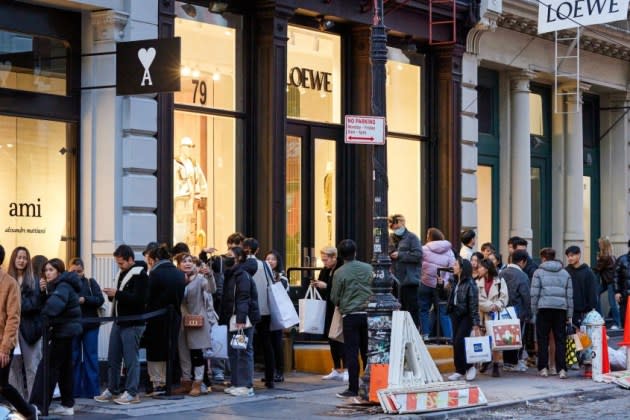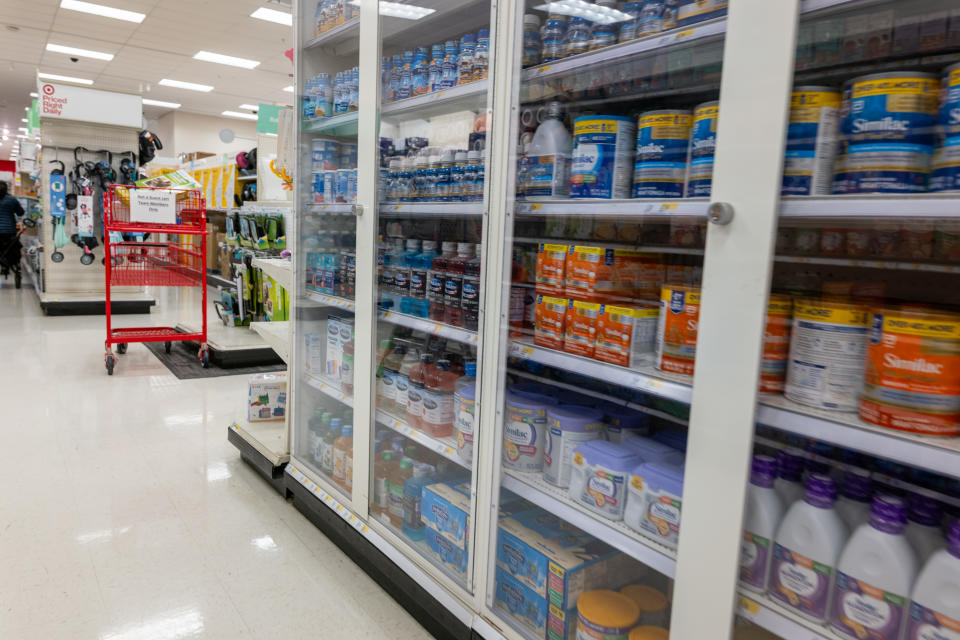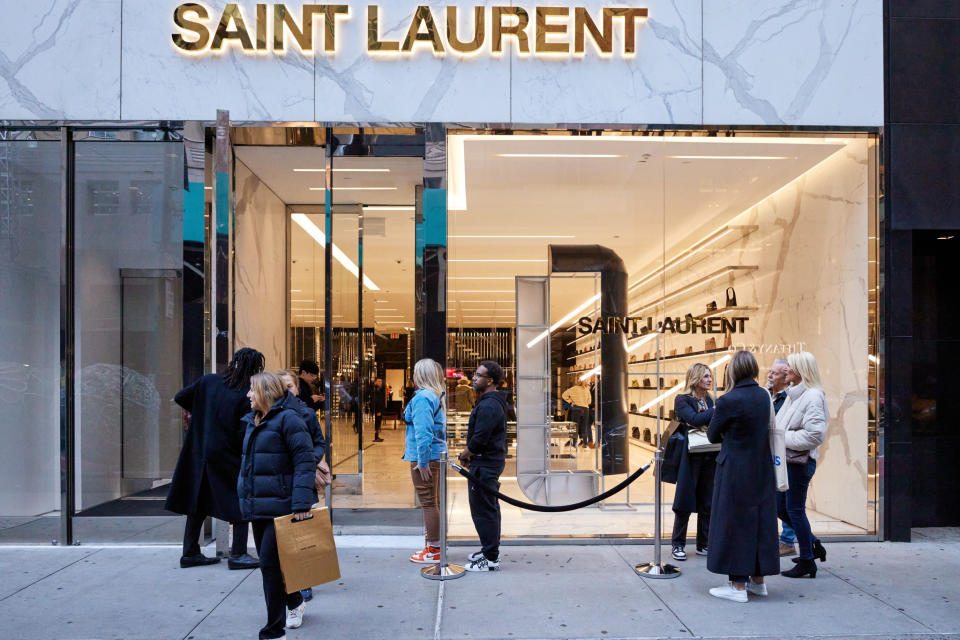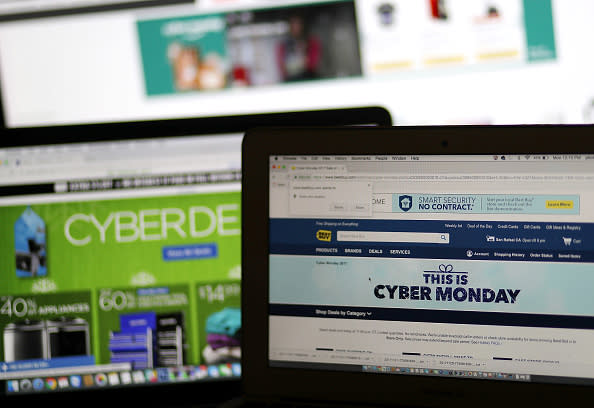Expectations Are Tempered for Black Friday Shopping

For Black Friday weekend, an anticipated huge turnout by holiday shoppers isn’t expected to bring commensurate sales activity.
In the aftermath of third-quarter sales declines at many major retailers, the Census Bureau’s report that overall retail sales in October were down 0.1 percent from September, and inflation’s impact on consumer spending power, the outlook for sales gains for the post-Thanksgiving weekend and the holiday season overall remains modest.
More from WWD
Holiday Retail Strategy: Doubling Down on AI and Omnichannel Approach Amid Economic Uncertainty
E-commerce Holiday Shopping: Consumer Frustrations Revealed in New Study
Also throwing cold water on the outlook are statistics and commentaries from companies monitoring retail sales and traffic. They suggest a slow start to 2023 holiday shopping so far, while acknowledging there will be the usual shopping surge on Black Friday weekend as retailers pump up their holiday price promotions, and Americans, after gobbling up their turkey dinners, get more into the gift-giving spirit.
“As we’ve seen already with the early start to Black Friday deals, nervous retailers are likely to promote heavily to try to win holiday shoppers’ attention,” said Steve Dennis, president and founder of SageBerry Consulting. “But way too much fuss is made about Black Friday as it’s not nearly as big a contributor to retailer profits as people think. As time has gone on it’s even less so, and most studies I’ve seen over time show that success by any given retailer across Black Friday-Cyber Monday has a weak correlation with how they do for the quarter.”
There’s also an awareness that with retailers triggering early Black Friday deals as far back as October, some consumers have already purchased gifts and have less cash for shopping in the days ahead. Along with inflation, Americans have been impacted by higher interest and borrowing costs and the resumption of student loan payments, forcing them to spend more of their earnings on necessities like food and gas, and less on clothes, home goods and electronics.
Target, Gap Inc., Bath & Body Works, The Container Store, Kohl’s Corp. and Macy’s Inc. all reported weak third-quarter sales, and the government indicated that consumers spent less at stores, dealerships and gas stations in October, marking the first decline since March.

In stores there’s rising crime, more merchandise is locked up, and in many cases, insufficient manpower to handle holiday traffic, all of which could deter some people from venturing out to shop. Most major stores including Macy’s, Target, Walmart and Best Buy are closed on Thanksgiving, but still transact online.
“This year, holiday sales will be more challenging to capture and more challenging to measure. Even Black Friday, which more shoppers identified as when they will get the best deals, is no longer limited to one day or to the walls of a physical store,” said Marshal Cohen, chief retail adviser for Circana, which researches consumer behavior and consults with retailers and brands.
More consumers shopping online this year “means less in-store impulse shopping and less social shopping, meaning less of the added unplanned spending that occurs with them,” Cohen said in his blog. “From convenience and safety concerns to increased online promotions, consumers have lots of reasons not to go into stores, which means retailers need to find ways to make up for the revenue opportunities that eliminates.”
“When you look at recent trends, traffic has started to decline in the 3 to 4 percent range,” said Joe Shasteen, global manager of advanced analytics at RetailNext, which tracks shoppers entering stores across the U.S. “From June through August, traffic was down 0.5 percent to 2 to 2.5 percent. From September through November, traffic was negative 3.5 to negative 4 percent. Typically, we see the week of Black Friday outperforming the weeks just preceding, so based on the trends I am seeing, my best estimate on expected traffic for the weekend would be flat to last year to negative 2 percent. Last year, Black Friday was plus 7 percent.” RetailNext’s data on U.S. shopper traffic, according to Shasteen, is drawn from approximately 7,500 stores with cameras at their entrances.

Experts at MRI Software, a provider of real estate and investment management software to property owners, investors and operators, predict Black Friday pedestrian traffic in New York City will decline around 3.3 percent. “Despite inflation easing, consumers are still paying 3.2 percent more for their essential items than in previous years, which is likely to restrain spending power,” Cederick Johnson, MRI’s brand and communications director, said in a statement. “However, it isn’t all doom and gloom for retailers within the city, as MRI Software’s most recent consumer survey highlighted that 75 percent of consumers will participate in Black Friday sales.
“New York City retailers should approach this festive season with tempered expectations, as 35 percent of consumers state they will be looking to spend less on gifts than last year,” said Johnson. “The main concern heading into the festive season for 45 percent of consumers is rising prices for essential items, which suggests that consumers are already treading carefully and may delay festive spending to maximize savings.”
According to Salesforce, a software firm specializing in sales data and tracking customer interactions to help businesses, early online holiday sales (Oct. 1 to Nov. 14) are down 2 percent in the U.S. and up 3 percent globally year-over-year, suggesting consumers are still searching for the biggest and best deals.
Shoppers continue to remain optimistic about the upcoming holiday shopping weekend despite inflation.”
Tom McGee, ICSC
From Tuesday through Monday, during Cyber Week, “We are likely to see discounts in the U.S. hovering around 30 percent across all categories,” said Rob Garf, vice president and general manager of retail at Salesforce. “To put that number in perspective, it’s 40 percent higher than Amazon Big Deals during October. There has been a lot of talk about an earlier start to the holiday season, but the reality is retailers have not shown up with attractive enough discounts and consumers are awaiting patiently for more aggressive Cyber Week deals.”
Salesforce said based on data from 1.5 billion shoppers in the U.S. and abroad, retailers have seen a slow start to the holiday shopping season, but Cyber Week should account for more than 25 percent of all holiday purchases this year.
Shopper traffic at shopping centers from Black Friday through the weekend should be good because people want to get out and because the weather will be favorable.
“It’s going to be cold and dry, coast-to-coast, this weekend,” said Evan Gold, executive vice president of Planalytics Inc., which uses weather forecasting to help retailers plan their business. “Most of this fall has been really warm so this is a good setup for anyone selling cold weather apparel and gear. It’s also good for foot traffic at shopping centers….New York for the weekend as a whole should be in the low to mid-40s. Last year it was in the 50s. Los Angeles will average in the mid-to-upper 50s, compared to the 60s last year. Chicago should be in the low-to-mid 30s versus last year’s low-to-mid 40s, with some rain and snow leading up to Black Friday affecting travel but not foot traffic. Last year we had the warmest Black Friday weekend since 2017 and the wettest since 2019.”

The National Retail Federation and Prosper Insights & Analytics estimates that 182 million people — 15.7 million more people than last year — are planning to shop in-store and online from Thanksgiving Day through Cyber Monday this year, according to their annual survey conducted Nov. 1 to 6 asking 8,424 adults about their holiday shopping plans.
According to the survey, 74 percent of holiday shoppers plan to shop during the five-day Thanksgiving holiday weekend, up from 69 percent in 2019, motivated by “deals too good to pass up” and by the tradition of gift shopping during that period. On Black Friday, 130.7 million Americans plan to shop; on Cyber Monday, 71.1 million plan to shop. As of early November, 59 percent of holiday shoppers started browsing and buying for the holiday season. On average, holiday shoppers have completed one-quarter of their planned purchases.
The NRF forecasts holiday spending up 3 to 4 percent, totaling $957.3 billion to $966.6 billion. Last year, holiday sales totaled $929.5 billion.
Another upbeat report came from the ICSC Thanksgiving Weekend Intentions Survey conducted online Nov. 10 to 12 with 1,006 respondents. The survey found that consumers expect to spend a total of $130 billion this holiday shopping weekend, a 4 percent increase from last year’s spending expectations. Ninety percent of consumers plan to shop during the Thanksgiving Day to Cyber Monday stretch, with two in five expecting to spend more on goods than last year. That means three in five plan to spend less or the same as last year.
RELATED: Saks Sees 75% of Luxe Shoppers Spending the Same or More This Holiday
“Shoppers continue to remain optimistic about the upcoming holiday shopping weekend despite inflation,” said Tom McGee, president and chief executive officer of ICSC. “We anticipate increased consumer spending and a strong shopping season for retailers during Thanksgiving weekend.”
Chad Lusk, managing director at Alvarez & Marsal’s Consumer and Retail Group, said that based on his firm’s fall 2023 Consumer Sentiment Survey, “While consumer outlook was more favorable in spring 2023, consumers are more pessimistic going into the winter months and plan to be more cautious with their spending. Despite this, we are seeing a year-over-year benefit in that consumers are still planning to participate more in holiday shopping when compared to fall 2022.”
The survey of 1,500 consumers found that they expect to save less money and have less money this season compared to spring 2023; they’re more motivated to join loyalty programs; they plan to spend more on basic needs, and less on experiences and indulgences; 67 percent believe prices will continue to rise, and 65 percent believe the U.S. will be in a recession within the next year.
Best of WWD


